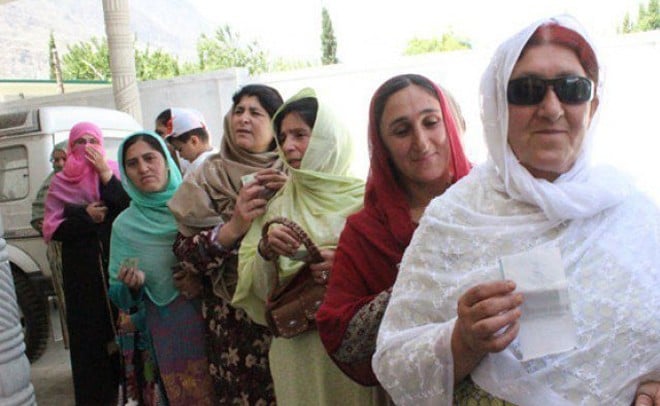
Women made history by turning up in large numbers at polling stations on the day of polling, especially in Diamer district

More women turned up at polling stations across Gilgit Baltistan (GB) to cast their vote on June 8 in elections in which Pakistan Peoples’ Party (PPP) suffered defeat in its stronghold after Pakistan Muslim League-Nawaz secured the most number of seats.
Though there were reports that a few jirgas were held in conservative towns -- Darel, Tangir, and some other areas of Diamer district -- to stop women from casting vote, women participated in large numbers in elections. The process completed peacefully all over GB as army was deployed to counter any threat to sabotage the elections.
Some political analysts term the defeat of PPP a setback in the area that is considered to be the stronghold of the party after Sindh. PML-N secured a clear lead in the polls held for 24 general seats of the GB Legislative Assembly. Even the PPP chief minister, Syed Mehdi Shah, failed to retain his seat. More women were seen casting votes in areas dominated by the Ismaili or Shia population as compared to that of the Sunni areas.
"Women made history by turning up in large numbers at polling stations on the day of polling, especially in Diamer district which is comparatively tribal and traditional. Voters irrespective of age, gender, and ethnicity came out and exercised their right to vote freely and independently," says Tahir Jabeen, a civil rights activist from GB working as communication and advocacy specialist with a reputed organisation.
Jabeen says that people are opening up and they want to be part of the mainstream society. "The highest turnout of female voters from conservative areas shows that things are changing. There is a big issue of education and health facilities as well as jobs all over GB, especially for women that need to be addressed properly and immediately," adds Jabeen.
A few women were among 272 candidates in the run for the 24 seats of the Legislative Assembly. Six members Legislative Assembly were elected from Skardu, four from Diamer, three each from Gilgit, Hunza Nagar, Ghizer and Ghanchi and two from Astore districts. "Six women and three technocrats are to be elected on reserved seats," Jabeen says. There were a total of 618,364 voters who participated in the process. The number of female voters in GB is 288,889. "The turnout of females in the polls remained 61 per cent against the overall 60 per cent," she informs.
Also read: Wings that restrain
The GB got the first ever female governor, Dr Shama Khalid, who was appointed in March 2010. She, however, could not serve for long and passed away in September 2010. Besides, GB got its first women vice chancellor in Najma Najam who was appointed head of the Karakoram International University in June 2010. There were a number of female politicians who played an important role during the last few decades.
"Women are an integral part of GB society who cannot and should not be ignored. They are deprived of their basic rights in some parts of the region, especially in Diamer and some parts of Astore Valley. The reason is that their literacy rate in the area is low," says Sher Ghazi, a voter from GB LA-NA3 Gilgit, talking to TNS.
He says women led from the front in the recent elections in GB. "A sister of Baba Jan, Naznain, led the entire election campaign for her brother who is behind the bars but was allowed by the court to contest from jail. I personally told my sisters and sister-in-law to go out and vote for the candidate of their choice," adds Ghazi, who is a former journalist working at a senior position in the private sector. Baba Jan has been awarded life imprisonment by a court after he was arrested along with 100 other protesters for violent protests in support of the displaced by the formation of Atta Abad Lake in 2011.
According to Ghazi, the female ratio is high in areas dominated by Ismailis, followed by the towns of the Shia community. He says areas where jirgas were held to bar women from voting are dominated by the Sunni population. "Women, however, did not remain inside their home in all the areas and came out to cast their vote. Now, those elected to the GB Legislative Assembly through their vote or by those females who will enter the house on reserved seats, must take care of the rights of women, especially their education, health and jobs," says Ghazi.